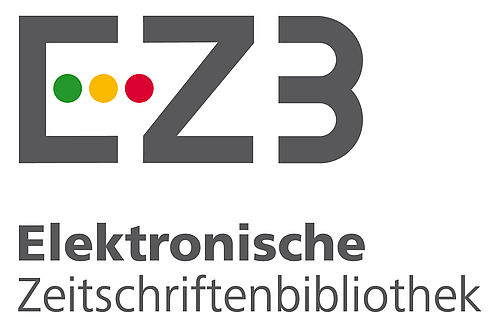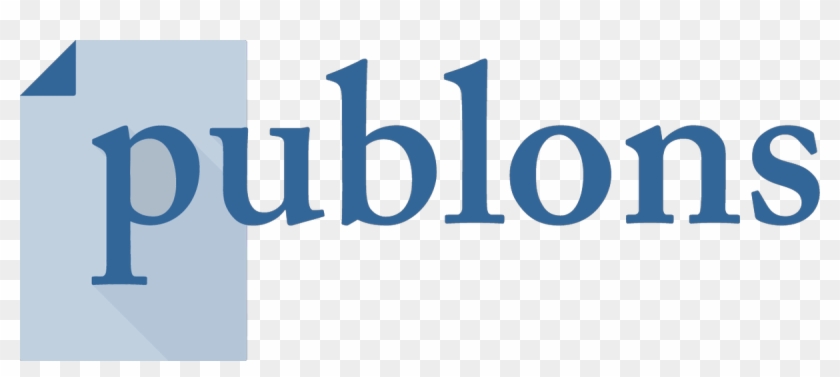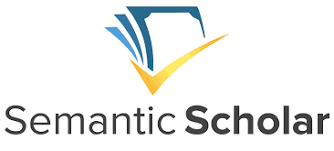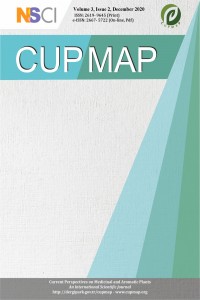Abstract
References
- Referans1 Abd El Aal, H.A., Ahmed, L.A., Hassan, W.A., Fawzy, H.M., and Moawad H., 2017. Combination of carvacrol with simvastatin improves the lipid-lowering efficacy and alleviates simvastatin side effects. Journal of Biochemical and Molecular Toxicology, 31, e21981. DOI number: 10.1002/jbt.21981.
- Referans2 Acquarone, E., Monacelli, F., Borghi, R., Nencioni, A., and Odetti, P., 2019. Resistin: A reappraisal. Mechanisms of Ageing and Development, 178, 46-63. DOI number: 10.1016/j.mad.2019.01.004.
- Referans3 Aguilar, D., and Fernandez, M.L., 2014. Hypercholesterolemia induces adipose dysfunction in conditions of obesity and nonobesity. Advances in Nutrition., 5 (5), 497-502.
- Referans4 Aharoni, S., Aviram, M., and Fuhrman, B. 2013. Paraoxonase 1 (PON1) reduces macrophage inflammatory responses. Atherosclerosis, 228 (2), 353-361. DOI number: 10.1016/j.atherosclerosis.2013.03.005.
- Referans5 Alissa, E.M., Alzughaibi, L.S., and Marzouki, Z.M., 2019. Association between serum resistin, adiposity measures and inflammatory makers in women without cardiovascular diseases. Chemistry and Physics of Lipids, 218, 136-140. DOI number: 10.1016/j.chemphyslip.2018.12.005.
- Referans6 Aslan, M., Kosecik, M., Horoz, M., Selek, S., Celik, H., and Erel, O., 2007. Assessment of paraoxonase and arylesterase activities in patients with iron deficiency anemia. Atherosclerosis, 191 (2), 397-402. DOI number: 10.1016/j.atherosclerosis.2006.04.007.
- Referans7 Ban, Y., Qiu, J., Ren, C., and Li, Z., 2015. Effects of different cooking methods of oatmeal on preventing the diet-induced increase of cholesterol level in hypercholesterolemic rats. Lipids in Health and Disease, 14, 135. DOI number: 10.1186/s12944-015-0138-7.
- Referans8 Berger, S., and Polotsky, V.Y., 2018. Leptin and leptin resistance in the pathogenesis of obstructive sleep apnea: A possible link to oxidative stress and cardiovascular complications. Oxidative Medicine and Cellular Longevity, 2018, 5137947. DOI number: 10.1155/2018/5137947.
- Referans9 Bluher, M., 2009. Adipose tissue dysfunction in obesity. Experimental and Clinical Endocrinology and Diabetes, 117 (6), 241-250. DOI number: 10.1055/s-0029-1192044.
- Referans10 Chhatre, S., Nesari, T., Somani, G., Kanchan, D., and Sathaye, S., 2014. Phytopharmacological overview of Tribulus terrestris. Pharmacognosy Reviews, 8 (15), 45-51. DOI number: 10.4103/0973-7847.125530.
- Referans11 Chung, S.I., Nam, S.J., Xu, M., Kang, M.Y., and Lee, S.C., 2016. Aged ginseng (Panax ginseng Meyer) reduces blood glucose levels and improves lipid metabolism in high fat diet-fed mice. Food Science and Biotechnology, 25 (1), 267-273. DOI number: 10.1007/s10068-016-0039-1.
- Referans12 Cobbold, C., 2019. Type 2 diabetes mellitus risk and exercise: is resistin involved? The Journal of Sports Medicine and Physical Fitness, 59 (2), 290-297. DOI number: 10.23736/s0022-4707.18.08258-0.
- Referans13 Davis, M.P., and Behm, B., 2019. Ginseng: A Qualitative review of benefits for palliative clinicians. The American Journal of Hospice and Palliative Care, 36 (7), 630-659. DOI number: 10.1177/1049909118822704.
- Referans14 Drozdowski, L.A., Reimer, R.A., Temelli, F., Bell, R.C., Vasanthan, T., and Thomson, A.B., 2010. Beta-glucan extracts inhibit the in vitro intestinal uptake of long-chain fatty acids and cholesterol and down-regulate genes involved in lipogenesis and lipid transport in rats. The Journal of Nutritional Biochemistry, 21 (8), 695-701. DOI number: 10.1016/j.jnutbio.2009.04.003.
- Referans15 Gandhi, S., Srinivasan, B.P., and Akarte, A.S., 2013. Potential nephrotoxic effects produced by steroidal saponins from hydro alcoholic extract of Tribulus terrestris in STZ-induced diabetic rats. Toxicology Mechanisms and Methods, 23 (7), 548-557. DOI number: 10.3109/15376516.2013.797533.
- Referans16 Gouveia, M., Borges, M., Costa, J., and Carneiro, A.V., 2004. Burden of disease from hypercholesterolemia in Portugal. Revista Portuguesa de Cardiologia, 23 (2), 255-270.
- Referans17 Han, S.F., Jiao, J., Zhang, W., Xu, J.Y., Zhang, W., Fu, C.L., and Qin, L.Q., 2017. Lipolysis and thermogenesis in adipose tissues as new potential mechanisms for metabolic benefits of dietary fiber. Nutrition, 33, 118-124. DOI number: 10.1016/j.nut.2016.05.006.
- Referans18 Ho, H.V., Sievenpiper, J.L., Zurbau, A., Blanco Mejia, S., Jovanovski, E., Au-Yeung, F., Jenkins, A.L. and Vuksan, V., 2016. The effect of oat beta-glucan on LDL-cholesterol, non-HDL-cholesterol and apoB for CVD risk reduction: a systematic review and meta-analysis of randomised-controlled trials. The British Journal of Nutrition, 116 (8), 1369-1382. DOI number: 10.1017/s000711451600341x.
- Referans19 Jiang, Y.H., Guo, J.H., Wu, S., and Yang, C.H., 2017. Vascular protective effects of aqueous extracts of Tribulus terrestris on hypertensive endothelial injury. Chinese Journal of Natural Medicines, 15 (8), 606-614. DOI number: 10.1016/s1875-5364(17)30088-2.
- Referans20 Jimoh, A., Tanko, Y., Ayo, J.O., Ahmed, A., Mohammed, A., 2018. Resveratrol increases serum adiponectin level and decreases leptin and insulin level in an experimental model of hypercholesterolemia. Pathophysiology, 25 (4), 411-417. DOI number: 10.1016/j.pathophys.2018.08.005.
- Referans21 Kim, J.K., Kim, J.Y., Jang, S.E., Choi, M.S., Jang, H.M., Yoo, H.H., Kim, D.H., 2018. Fermented red ginseng alleviates cyclophosphamide-induced immunosuppression and 2,4,6-trinitrobenzenesulfonic acid-induced colitis in mice by regulating macrophage activation and T cell differentiation. The American Journal of Chinese Medicine, 46 (8), 1879-1897. DOI number: 10.1142/s0192415x18500945.
- Referans22 Klein-Szanto, A.J.P., and Bassi, D., 2019. Keep recycling going: new approaches to reduce LDL-C. Biochemical Pharmacology, 164, 336-341. DOI number: 10.1016/j.bcp.2019.04.003.
- Referans23 Koh, K.K., Oh, P.C., Sakuma, I., Lee, Y., Han, S.H., and Shin, E.K., 2016. Rosuvastatin dose-dependently improves flow-mediated dilation, but reduces adiponectin levels and insulin sensitivity in hypercholesterolemic patients. International Journal of Cardiology, 223, 488-493. DOI number: 10.1016/j.ijcard.2016.08.051.
- Referans24 Koh, K.K., Quon, M.J., Han, S.H., Lee, Y., Ahn, J.Y., Kim, S.J., Koh, Y., and Shin, E.K., 2008. Simvastatin improves flow-mediated dilation but reduces adiponectin levels and insulin sensitivity in hypercholesterolemic patients. Diabetes Care, 31 (4), 776-782. DOI number: 10.2337/dc07-2199.
- Referans25 Koh, K.K., Quon, M.J., Han, S.H., Lee, Y., Kim, S.J., Shin, E.K., 2010. Atorvastatin causes insulin resistance and increases ambient glycemia in hypercholesterolemic patients. Jornal of the American College of Cardiology, 55 (12), 1209-1216. DOI number: 10.1016/j.jacc.2009.10.053.
- Referans26 Lamounier-Zepter, V., Look, C., Ehrhart-Bornstein, M., Bornstein, S.R., Fischer, S., and Julius, U., 2013. Lipoprotein apheresis reduces adipocyte fatty acid-binding protein serum levels. Atherosclerosis. Supplements, 14 (1): 129-134. DOI number: 10.1016/j.atherosclerosissup.2012.10.010.
- Referans27 Lee, M.R., Kim, B.C., Kim, R., Oh, H.I., Kim, H.K., Choi, K.J., and Sung, C.K., 2013a. Anti-obesity effects of black ginseng extract in high fat diet-fed mice. Jornal of Ginseng Research, 37 (3), 308-349. DOI number: 10.5142/jgr.2013.37.308.
- Referans28 Lee C.Y., Jan, M.S., Yu, M.C., Lin, C.C., Wei, J.C., and Shih, H.C., 2013b. Relationship between adiponectin and leptin, and blood lipids in hyperlipidemia patients treated with red yeast rice. Forschende Komplementarmedizin, 20 (3), 197-203. DOI number: 10.1159/000351455.
- Referans29 Li, Z., Kim, H.J., Park, M.S., and Ji, G.E., 2018. Effects of fermented ginseng root and ginseng berry on obesity and lipid metabolism in mice fed a high-fat diet. Journal of Ginseng Research, 42 (3), 312-319. DOI number: 10.1016/j.jgr.2017.04.001.
- Referans30 Li, J., and Shen, X., 2019. Oxidative stress and adipokine levels were significantly correlated in diabetic patients with hyperglycemic crises. Diabetology and Metabolic Syndrome, 11, 13. DOI number: 10.1186/s13098-019-0410-5.
- Referans31 Liu, H., Wang, J., Liu, M., Zhao, H., Yaqoob, S., Zheng, M., Cai, D., and Liu, J., 2018. Antiobesity effects of ginsenoside Rg1 on 3T3-L1 preadipocytes and high fat diet-induced obese mice mediated by AMPK. Nutrients, 10 (7), 830. DOI number: 10.3390/nu10070830.
- Referans32 Mechanick, J.I., Zhao, S., Garvey, W.T., 2018. Leptin, an adipokine with central importance in the global obesity problem. Global Heart, 13 (2), 113-127. DOI number: 10.1016/j.gheart.2017.10.003.
- Referans33 Metwally, F.M., Rashad, H., and Mahmoud, A.A., 2019. Morus alba L. diminishes visceral adiposity, insulin resistance, behavioral alterations via regulation of gene expression of leptin, resistin and adiponectin in rats fed a high-cholesterol diet. Physiology and Behavior, 201, 1-11. DOI number: 10.1016/j.physbeh.2018.12.010.
- Referans34 Queenan, K.M., Stewart, M.L., Smith, K.N., Thomas, W., Fulcher, R.G., and Slavin, J.L., 2007. Concentrated oat beta-glucan, a fermentable fiber, lowers serum cholesterol in hypercholesterolemic adults in a randomized controlled trial. Nutrition Journal, 6, 6. DOI number: 10.1186/1475-2891-6-6.
- Referans35 Robertson, J., Iemolo, F., Stabler, S.P., Allen, R.H., and Spence, J.D., 2005. Vitamin B12, homocysteine and carotid plaque in the era of folic acid fortification of enriched cereal grain products. Canadian Medical Associaiton Journal, 172 (12), 1569-1573. DOI number: 10.1503/cmaj.045055.
- Referans36 Rozenberg, O., Shih, D.M., and Aviram, M., 2005. Paraoxonase 1 (PON1) attenuates macrophage oxidative status: studies in PON1 transfected cells and in PON1 transgenic mice. Atherosclerosis, 181 (1), 9-18. DOI number: 10.1016/j.atherosclerosis.2004.12.030.
- Referans37 Saba, E., Jeon, B.R., Jeong, D.H., Lee, K., Goo, Y.K., Kim, S.H., Sung, C.K., Roh, S.S., Kim, S.D., Kim, H.K., and Rhee, M.H., 2016. Black ginseng extract ameliorates hypercholesterolemia in rats. Journal of Ginseng Research, 40 (2), 160-168. DOI number: 10.1016/j.jgr.2015.07.003.
- Referans38 Samani, N.B., Jokar, A., Soveid, M., Heydari, M., and Mosavat, S.H., 2016. Efficacy of the hydroalcoholic extract of Tribulus terrestris on the serum glucose and lipid profile of women with diabetes mellitus: A double-blind randomized placebo-controlled clinical trial. Journal of Evidence-Based Complementary and Alternative Medicine, 21 (4), Np91-97. DOI number: 10.1177/2156587216650775.
- Referans39 Shih, D.M., Xia, Y.R., Wang, X.P., Miller, E., Castellani, L.W., Subbanagounder, G., Cheroutre, H., Faull, K.F., Berliner, J.A., Witztum, J.L., and Lusis, A.J., 2000. Combined serum paraoxonase knockout/apolipoprotein E knockout mice exhibit increased lipoprotein oxidation and atherosclerosis. The Journal of Biological Chemistry, 275 (23), 17527-17535. DOI number: 10.1074/jbc.M910376199.
- Referans40 Singh, R., De, S., and Belkheir, A., 2013. Avena sativa (Oat), a potential neutraceutical and therapeutic agent: an overview. Critical Reviews in Food Science and Nutrition, 53 (2), 126-144, 2013. DOI number: 10.1080/10408398.2010.526725.
- Referans41 Steppan, C.M., Bailey, S.T., Bhat, S., Brown, E.J., Banerjee, R.R., Wright, C.M., Patel, H.R., Ahima, R.S., and Lazar, M.A., 2001. The hormone resistin links obesity to diabetes. Nature, 409 (6818), 307-312. DOI number: 10.1038/35053000.
- Referans42 Tong, L.T., Guo, L., Zhou, X., Qiu, J., Liu, L., Zhong, K., and Zhou, S., 2016. Effects of dietary oat proteins on cholesterol metabolism of hypercholesterolaemic hamsters. Journal of the Science of Food and Agriculture, 96 (4), 1396-1401. DOI number: 10.1002/jsfa.7236.
- Referans43 Tu, W.J., Zeng, X.W., Deng, A., Zhao, S.J., Luo, D.Z., Ma, G.Z., Wang, H., and Liu, Q., 2017. Circulating FABP4 (Fatty Acid-Binding Protein 4) Is a novel prognostic biomarker in patients with acute ischemic stroke. Stroke, 48 (6), 1531-1538. DOI number: 10.1161/strokeaha.117.017128.
- Referans44 Whitehead, A., Beck, E.J., Tosh, S., and Wolever, T.M., 2014. Cholesterol-lowering effects of oat beta-glucan: a meta-analysis of randomized controlled trials. The American Journal of Clinical Nutrition, 100 (6), 1413-1421. DOI number: 10.3945/ajcn.114.086108.
- Referans45 Wu, Y.; Huang, X.F.; Bell, C. and Yu, Y. (2018). Ginsenoside Rb1 improves leptin sensitivity in the prefrontal cortex in obese mice. CNS Neuroscience and Therapeutics, 24 (2), 98-107. DOI number: 10.1111/cns.12776.
- Referans46 Xu, Z.M., Li, C.B., Liu, Q.L., Li, P., and Yang, H., 2018. Ginsenoside Rg1 prevents doxorubicin-induced cardiotoxicity through the inhibition of autophagy and endoplasmic reticulum stress in mice. International Journal of Molecular Sciences, 19 (11), 3658. DOI number: 10.3390/ijms19113658.
- Referans47 Yanai, H., and Yoshida, H., 2019. Beneficial effects of adiponectin on glucose and lipid metabolism and atherosclerotic progression: Mechanisms and perspectives. International Journal of Molecular Sciences, 20 (5), 1190. DOI number: 10.3390/ijms20051190.
- Referans48 Zhang, R., Jiao, J., Zhang, W., Zhang, Z., Zhang, W., Qin, L.Q., and Han, S.F., 2016. Effects of cereal fiber on leptin resistance and sensitivity in C57BL/6J mice fed a high-fat/cholesterol diet. Food and Nutrition Research, 60, 31690. DOI number: 10.3402/fnr.v60.31690.
Effects of Tribulus terrestris, Avena sativa and White Ginseng on Adiponectin, Leptin, Resistin, Fatty Acid Binding Protein 4, Homocysteine and Paraoxonase-1 Levels in Hypercholesterolemic Rats
Abstract
This study was aimed to evaluate the effects of Tribulus terrestris (TT), Avena sativa (AS), white ginseng (WG), and a triple combination (TC) powder on adipokines, homocysteine and paraoxonase-1 levels in hypercholesterolemic rats. Hypercholesterolemia in rats was induced by diet added 2% cholesterol. Herbal treatment groups consisted of Group III (TT), Group IV (AS), Group V (WG) and Group VI (triple combination of TT, AS, and WG). Significant increase in total cholesterol, LDL-C, homocysteine, leptin and resistin levels (P<0.05) and insignificant decrease in adiponectin, and paraoxonase-1 levels (P>0.05) were found in hypercholesterolemic rats. The treatment combination with TT, AS and WG significantly reduced total cholesterol, LDL-C, homocysteine, leptin and resistin levels in hypercholesterolemic rats (P<0.05). In conclusion, it was found that TT, AS and WG had positive effects on reversing the effects of hypercholesterolemia in rats. The combination treatment with TT, AS and WG may have therapeutic effects in the treatment of hypercholesterolemia.
References
- Referans1 Abd El Aal, H.A., Ahmed, L.A., Hassan, W.A., Fawzy, H.M., and Moawad H., 2017. Combination of carvacrol with simvastatin improves the lipid-lowering efficacy and alleviates simvastatin side effects. Journal of Biochemical and Molecular Toxicology, 31, e21981. DOI number: 10.1002/jbt.21981.
- Referans2 Acquarone, E., Monacelli, F., Borghi, R., Nencioni, A., and Odetti, P., 2019. Resistin: A reappraisal. Mechanisms of Ageing and Development, 178, 46-63. DOI number: 10.1016/j.mad.2019.01.004.
- Referans3 Aguilar, D., and Fernandez, M.L., 2014. Hypercholesterolemia induces adipose dysfunction in conditions of obesity and nonobesity. Advances in Nutrition., 5 (5), 497-502.
- Referans4 Aharoni, S., Aviram, M., and Fuhrman, B. 2013. Paraoxonase 1 (PON1) reduces macrophage inflammatory responses. Atherosclerosis, 228 (2), 353-361. DOI number: 10.1016/j.atherosclerosis.2013.03.005.
- Referans5 Alissa, E.M., Alzughaibi, L.S., and Marzouki, Z.M., 2019. Association between serum resistin, adiposity measures and inflammatory makers in women without cardiovascular diseases. Chemistry and Physics of Lipids, 218, 136-140. DOI number: 10.1016/j.chemphyslip.2018.12.005.
- Referans6 Aslan, M., Kosecik, M., Horoz, M., Selek, S., Celik, H., and Erel, O., 2007. Assessment of paraoxonase and arylesterase activities in patients with iron deficiency anemia. Atherosclerosis, 191 (2), 397-402. DOI number: 10.1016/j.atherosclerosis.2006.04.007.
- Referans7 Ban, Y., Qiu, J., Ren, C., and Li, Z., 2015. Effects of different cooking methods of oatmeal on preventing the diet-induced increase of cholesterol level in hypercholesterolemic rats. Lipids in Health and Disease, 14, 135. DOI number: 10.1186/s12944-015-0138-7.
- Referans8 Berger, S., and Polotsky, V.Y., 2018. Leptin and leptin resistance in the pathogenesis of obstructive sleep apnea: A possible link to oxidative stress and cardiovascular complications. Oxidative Medicine and Cellular Longevity, 2018, 5137947. DOI number: 10.1155/2018/5137947.
- Referans9 Bluher, M., 2009. Adipose tissue dysfunction in obesity. Experimental and Clinical Endocrinology and Diabetes, 117 (6), 241-250. DOI number: 10.1055/s-0029-1192044.
- Referans10 Chhatre, S., Nesari, T., Somani, G., Kanchan, D., and Sathaye, S., 2014. Phytopharmacological overview of Tribulus terrestris. Pharmacognosy Reviews, 8 (15), 45-51. DOI number: 10.4103/0973-7847.125530.
- Referans11 Chung, S.I., Nam, S.J., Xu, M., Kang, M.Y., and Lee, S.C., 2016. Aged ginseng (Panax ginseng Meyer) reduces blood glucose levels and improves lipid metabolism in high fat diet-fed mice. Food Science and Biotechnology, 25 (1), 267-273. DOI number: 10.1007/s10068-016-0039-1.
- Referans12 Cobbold, C., 2019. Type 2 diabetes mellitus risk and exercise: is resistin involved? The Journal of Sports Medicine and Physical Fitness, 59 (2), 290-297. DOI number: 10.23736/s0022-4707.18.08258-0.
- Referans13 Davis, M.P., and Behm, B., 2019. Ginseng: A Qualitative review of benefits for palliative clinicians. The American Journal of Hospice and Palliative Care, 36 (7), 630-659. DOI number: 10.1177/1049909118822704.
- Referans14 Drozdowski, L.A., Reimer, R.A., Temelli, F., Bell, R.C., Vasanthan, T., and Thomson, A.B., 2010. Beta-glucan extracts inhibit the in vitro intestinal uptake of long-chain fatty acids and cholesterol and down-regulate genes involved in lipogenesis and lipid transport in rats. The Journal of Nutritional Biochemistry, 21 (8), 695-701. DOI number: 10.1016/j.jnutbio.2009.04.003.
- Referans15 Gandhi, S., Srinivasan, B.P., and Akarte, A.S., 2013. Potential nephrotoxic effects produced by steroidal saponins from hydro alcoholic extract of Tribulus terrestris in STZ-induced diabetic rats. Toxicology Mechanisms and Methods, 23 (7), 548-557. DOI number: 10.3109/15376516.2013.797533.
- Referans16 Gouveia, M., Borges, M., Costa, J., and Carneiro, A.V., 2004. Burden of disease from hypercholesterolemia in Portugal. Revista Portuguesa de Cardiologia, 23 (2), 255-270.
- Referans17 Han, S.F., Jiao, J., Zhang, W., Xu, J.Y., Zhang, W., Fu, C.L., and Qin, L.Q., 2017. Lipolysis and thermogenesis in adipose tissues as new potential mechanisms for metabolic benefits of dietary fiber. Nutrition, 33, 118-124. DOI number: 10.1016/j.nut.2016.05.006.
- Referans18 Ho, H.V., Sievenpiper, J.L., Zurbau, A., Blanco Mejia, S., Jovanovski, E., Au-Yeung, F., Jenkins, A.L. and Vuksan, V., 2016. The effect of oat beta-glucan on LDL-cholesterol, non-HDL-cholesterol and apoB for CVD risk reduction: a systematic review and meta-analysis of randomised-controlled trials. The British Journal of Nutrition, 116 (8), 1369-1382. DOI number: 10.1017/s000711451600341x.
- Referans19 Jiang, Y.H., Guo, J.H., Wu, S., and Yang, C.H., 2017. Vascular protective effects of aqueous extracts of Tribulus terrestris on hypertensive endothelial injury. Chinese Journal of Natural Medicines, 15 (8), 606-614. DOI number: 10.1016/s1875-5364(17)30088-2.
- Referans20 Jimoh, A., Tanko, Y., Ayo, J.O., Ahmed, A., Mohammed, A., 2018. Resveratrol increases serum adiponectin level and decreases leptin and insulin level in an experimental model of hypercholesterolemia. Pathophysiology, 25 (4), 411-417. DOI number: 10.1016/j.pathophys.2018.08.005.
- Referans21 Kim, J.K., Kim, J.Y., Jang, S.E., Choi, M.S., Jang, H.M., Yoo, H.H., Kim, D.H., 2018. Fermented red ginseng alleviates cyclophosphamide-induced immunosuppression and 2,4,6-trinitrobenzenesulfonic acid-induced colitis in mice by regulating macrophage activation and T cell differentiation. The American Journal of Chinese Medicine, 46 (8), 1879-1897. DOI number: 10.1142/s0192415x18500945.
- Referans22 Klein-Szanto, A.J.P., and Bassi, D., 2019. Keep recycling going: new approaches to reduce LDL-C. Biochemical Pharmacology, 164, 336-341. DOI number: 10.1016/j.bcp.2019.04.003.
- Referans23 Koh, K.K., Oh, P.C., Sakuma, I., Lee, Y., Han, S.H., and Shin, E.K., 2016. Rosuvastatin dose-dependently improves flow-mediated dilation, but reduces adiponectin levels and insulin sensitivity in hypercholesterolemic patients. International Journal of Cardiology, 223, 488-493. DOI number: 10.1016/j.ijcard.2016.08.051.
- Referans24 Koh, K.K., Quon, M.J., Han, S.H., Lee, Y., Ahn, J.Y., Kim, S.J., Koh, Y., and Shin, E.K., 2008. Simvastatin improves flow-mediated dilation but reduces adiponectin levels and insulin sensitivity in hypercholesterolemic patients. Diabetes Care, 31 (4), 776-782. DOI number: 10.2337/dc07-2199.
- Referans25 Koh, K.K., Quon, M.J., Han, S.H., Lee, Y., Kim, S.J., Shin, E.K., 2010. Atorvastatin causes insulin resistance and increases ambient glycemia in hypercholesterolemic patients. Jornal of the American College of Cardiology, 55 (12), 1209-1216. DOI number: 10.1016/j.jacc.2009.10.053.
- Referans26 Lamounier-Zepter, V., Look, C., Ehrhart-Bornstein, M., Bornstein, S.R., Fischer, S., and Julius, U., 2013. Lipoprotein apheresis reduces adipocyte fatty acid-binding protein serum levels. Atherosclerosis. Supplements, 14 (1): 129-134. DOI number: 10.1016/j.atherosclerosissup.2012.10.010.
- Referans27 Lee, M.R., Kim, B.C., Kim, R., Oh, H.I., Kim, H.K., Choi, K.J., and Sung, C.K., 2013a. Anti-obesity effects of black ginseng extract in high fat diet-fed mice. Jornal of Ginseng Research, 37 (3), 308-349. DOI number: 10.5142/jgr.2013.37.308.
- Referans28 Lee C.Y., Jan, M.S., Yu, M.C., Lin, C.C., Wei, J.C., and Shih, H.C., 2013b. Relationship between adiponectin and leptin, and blood lipids in hyperlipidemia patients treated with red yeast rice. Forschende Komplementarmedizin, 20 (3), 197-203. DOI number: 10.1159/000351455.
- Referans29 Li, Z., Kim, H.J., Park, M.S., and Ji, G.E., 2018. Effects of fermented ginseng root and ginseng berry on obesity and lipid metabolism in mice fed a high-fat diet. Journal of Ginseng Research, 42 (3), 312-319. DOI number: 10.1016/j.jgr.2017.04.001.
- Referans30 Li, J., and Shen, X., 2019. Oxidative stress and adipokine levels were significantly correlated in diabetic patients with hyperglycemic crises. Diabetology and Metabolic Syndrome, 11, 13. DOI number: 10.1186/s13098-019-0410-5.
- Referans31 Liu, H., Wang, J., Liu, M., Zhao, H., Yaqoob, S., Zheng, M., Cai, D., and Liu, J., 2018. Antiobesity effects of ginsenoside Rg1 on 3T3-L1 preadipocytes and high fat diet-induced obese mice mediated by AMPK. Nutrients, 10 (7), 830. DOI number: 10.3390/nu10070830.
- Referans32 Mechanick, J.I., Zhao, S., Garvey, W.T., 2018. Leptin, an adipokine with central importance in the global obesity problem. Global Heart, 13 (2), 113-127. DOI number: 10.1016/j.gheart.2017.10.003.
- Referans33 Metwally, F.M., Rashad, H., and Mahmoud, A.A., 2019. Morus alba L. diminishes visceral adiposity, insulin resistance, behavioral alterations via regulation of gene expression of leptin, resistin and adiponectin in rats fed a high-cholesterol diet. Physiology and Behavior, 201, 1-11. DOI number: 10.1016/j.physbeh.2018.12.010.
- Referans34 Queenan, K.M., Stewart, M.L., Smith, K.N., Thomas, W., Fulcher, R.G., and Slavin, J.L., 2007. Concentrated oat beta-glucan, a fermentable fiber, lowers serum cholesterol in hypercholesterolemic adults in a randomized controlled trial. Nutrition Journal, 6, 6. DOI number: 10.1186/1475-2891-6-6.
- Referans35 Robertson, J., Iemolo, F., Stabler, S.P., Allen, R.H., and Spence, J.D., 2005. Vitamin B12, homocysteine and carotid plaque in the era of folic acid fortification of enriched cereal grain products. Canadian Medical Associaiton Journal, 172 (12), 1569-1573. DOI number: 10.1503/cmaj.045055.
- Referans36 Rozenberg, O., Shih, D.M., and Aviram, M., 2005. Paraoxonase 1 (PON1) attenuates macrophage oxidative status: studies in PON1 transfected cells and in PON1 transgenic mice. Atherosclerosis, 181 (1), 9-18. DOI number: 10.1016/j.atherosclerosis.2004.12.030.
- Referans37 Saba, E., Jeon, B.R., Jeong, D.H., Lee, K., Goo, Y.K., Kim, S.H., Sung, C.K., Roh, S.S., Kim, S.D., Kim, H.K., and Rhee, M.H., 2016. Black ginseng extract ameliorates hypercholesterolemia in rats. Journal of Ginseng Research, 40 (2), 160-168. DOI number: 10.1016/j.jgr.2015.07.003.
- Referans38 Samani, N.B., Jokar, A., Soveid, M., Heydari, M., and Mosavat, S.H., 2016. Efficacy of the hydroalcoholic extract of Tribulus terrestris on the serum glucose and lipid profile of women with diabetes mellitus: A double-blind randomized placebo-controlled clinical trial. Journal of Evidence-Based Complementary and Alternative Medicine, 21 (4), Np91-97. DOI number: 10.1177/2156587216650775.
- Referans39 Shih, D.M., Xia, Y.R., Wang, X.P., Miller, E., Castellani, L.W., Subbanagounder, G., Cheroutre, H., Faull, K.F., Berliner, J.A., Witztum, J.L., and Lusis, A.J., 2000. Combined serum paraoxonase knockout/apolipoprotein E knockout mice exhibit increased lipoprotein oxidation and atherosclerosis. The Journal of Biological Chemistry, 275 (23), 17527-17535. DOI number: 10.1074/jbc.M910376199.
- Referans40 Singh, R., De, S., and Belkheir, A., 2013. Avena sativa (Oat), a potential neutraceutical and therapeutic agent: an overview. Critical Reviews in Food Science and Nutrition, 53 (2), 126-144, 2013. DOI number: 10.1080/10408398.2010.526725.
- Referans41 Steppan, C.M., Bailey, S.T., Bhat, S., Brown, E.J., Banerjee, R.R., Wright, C.M., Patel, H.R., Ahima, R.S., and Lazar, M.A., 2001. The hormone resistin links obesity to diabetes. Nature, 409 (6818), 307-312. DOI number: 10.1038/35053000.
- Referans42 Tong, L.T., Guo, L., Zhou, X., Qiu, J., Liu, L., Zhong, K., and Zhou, S., 2016. Effects of dietary oat proteins on cholesterol metabolism of hypercholesterolaemic hamsters. Journal of the Science of Food and Agriculture, 96 (4), 1396-1401. DOI number: 10.1002/jsfa.7236.
- Referans43 Tu, W.J., Zeng, X.W., Deng, A., Zhao, S.J., Luo, D.Z., Ma, G.Z., Wang, H., and Liu, Q., 2017. Circulating FABP4 (Fatty Acid-Binding Protein 4) Is a novel prognostic biomarker in patients with acute ischemic stroke. Stroke, 48 (6), 1531-1538. DOI number: 10.1161/strokeaha.117.017128.
- Referans44 Whitehead, A., Beck, E.J., Tosh, S., and Wolever, T.M., 2014. Cholesterol-lowering effects of oat beta-glucan: a meta-analysis of randomized controlled trials. The American Journal of Clinical Nutrition, 100 (6), 1413-1421. DOI number: 10.3945/ajcn.114.086108.
- Referans45 Wu, Y.; Huang, X.F.; Bell, C. and Yu, Y. (2018). Ginsenoside Rb1 improves leptin sensitivity in the prefrontal cortex in obese mice. CNS Neuroscience and Therapeutics, 24 (2), 98-107. DOI number: 10.1111/cns.12776.
- Referans46 Xu, Z.M., Li, C.B., Liu, Q.L., Li, P., and Yang, H., 2018. Ginsenoside Rg1 prevents doxorubicin-induced cardiotoxicity through the inhibition of autophagy and endoplasmic reticulum stress in mice. International Journal of Molecular Sciences, 19 (11), 3658. DOI number: 10.3390/ijms19113658.
- Referans47 Yanai, H., and Yoshida, H., 2019. Beneficial effects of adiponectin on glucose and lipid metabolism and atherosclerotic progression: Mechanisms and perspectives. International Journal of Molecular Sciences, 20 (5), 1190. DOI number: 10.3390/ijms20051190.
- Referans48 Zhang, R., Jiao, J., Zhang, W., Zhang, Z., Zhang, W., Qin, L.Q., and Han, S.F., 2016. Effects of cereal fiber on leptin resistance and sensitivity in C57BL/6J mice fed a high-fat/cholesterol diet. Food and Nutrition Research, 60, 31690. DOI number: 10.3402/fnr.v60.31690.
Details
| Primary Language | English |
|---|---|
| Journal Section | Research Articles |
| Authors | |
| Publication Date | December 24, 2020 |
| Published in Issue | Year 2020 Volume: 3 Issue: 2 |
Cite
-------------------------------------------------------------------------------------------------------------------------------













-------------------------------------------------------------------------------------------------------------------------
 CUPMAP Journal is licensed under a Creative Commons Attribution-NonCommercial-NoDerivatives 4.0 International License.
CUPMAP Journal is licensed under a Creative Commons Attribution-NonCommercial-NoDerivatives 4.0 International License.
-----------------------------------------------------------------------------------------------------------------------------------------
This is an open access journal which means that all content is freely available without charge to the user or his/her institution. Users are allowed to read, download, copy, distribute, print, search, or link to the full texts of the articles, or use them for any other lawful purpose, without asking prior permission from the publisher or the author. This is in accordance with the BOAI definition of open access.

